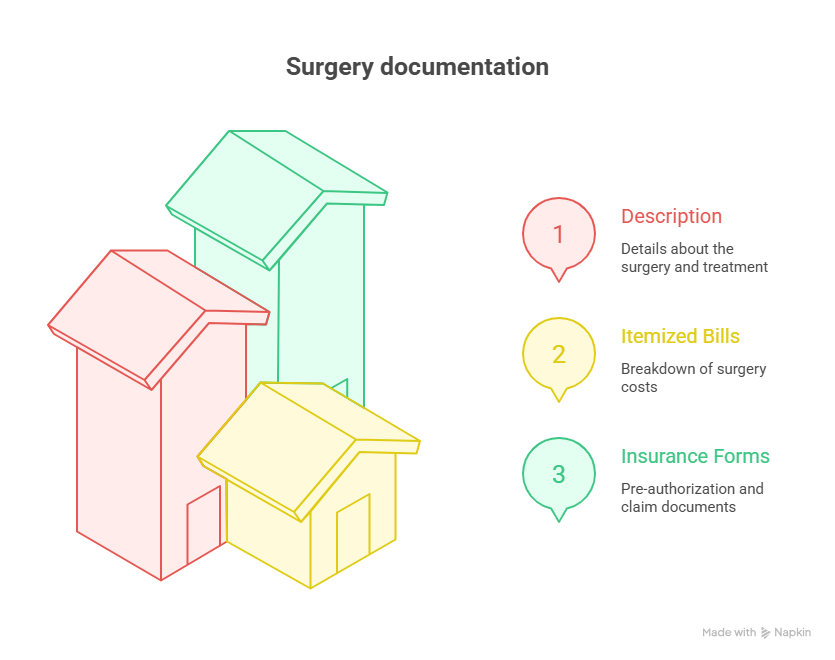Did you know that every year, millions of Americans have surgery? Many of them suffer severe financial hardships as a result of their ignorance about surgery insurance coverage.
It is essential for people to comprehend how to submit an insurance claim for surgery in order to successfully navigate the intricate healthcare system.
Financial stress can be significantly decreased by being aware of the usual deadlines and essential paperwork. To assist you with making wise healthcare selections, we will go over the specifics of surgical treatment reimbursement in this post.
Understanding Surgery Insurance Coverage
Knowing what your insurance covers is essential when it comes to surgery in order to prevent unforeseen medical expenses. While each plan has different coverage for surgery, most cover necessary surgical procedures.
Types of Surgical Procedures Covered
The majority of insurance policies pay for necessary surgeries, even occasionally elective ones. Usually covered are:
- Fees for the surgeon
- Fees for anesthesia
- Stay in the hospital
In-Network vs. Out-of-Network Considerations
By selecting an in-network provider, you can drastically lower your out-of-pocket costs. This is an analogy:
| Provider Type | Average Cost | Insurance Coverage |
|---|---|---|
| In-Network | $10,000 | 80% |
| Out-of-Network | $15,000 | 50% |
Pre-Authorization Requirements
For surgical operations, pre-authorization is frequently necessary. To prevent denials of claims, make sure you:
- Get pre-authorization before to the procedure.
- Check the preauthorization information with your insurance company.
The Insurance Reimbursement for Surgery Process
For a seamless and stress-free experience, it is essential to comprehend the insurance reimbursement method for surgical treatments. From obtaining necessary documentation to submitting a claim and comprehending the usual payment schedules, the procedure entails a number of crucial procedures.
Essential Documents for Your Claim
Getting all required paperwork together is essential to starting the compensation procedure. These consist of:
Medical Records and Physician Notes
Physician notes and medical records are essential because they include comprehensive details on the procedure, such as the diagnosis, course of therapy, and any problems.
Itemized Bills and Payment Receipts
Payment receipts and itemized bills are required to confirm the surgery’s expenses. Make sure all costs are included and that these records are comprehensive.
Insurance Forms and Correspondence
You should maintain a copy of any insurance documents and correspondence pertaining to your procedure and claim. Pre-authorization paperwork and correspondence with your insurance company are included in this.
| Document Type | Description | Importance |
|---|---|---|
| Medical Records | Details about the surgery and treatment | High |
| Itemized Bills | Breakdown of surgery costs | High |
| Insurance Forms | Pre-authorization and claim documents | High |

Step-by-Step Claim Filing Guide
There are multiple steps involved in filing a claim:
- Fill out the claim form completely, making sure to include all necessary details.
- Include all required paperwork, such as itemized bills and medical records.
- Using the appropriate method, submit the claim to your insurance company.
- Check the progress of your claim and respond quickly to any questions or requests for more information..
Typical Reimbursement Timelines
Depending on the insurance company and the intricacy of the claim, the payment schedule may change. The typical turnaround time for compensation is a few weeks to a few months.
Patients can assure a smoother experience and better manage the complicated insurance reimbursement process for surgery by being aware of the required paperwork and stages.
Conclusion
It’s important to know what your health insurance covers in terms of surgery insurance reimbursement. You can guarantee a seamless experience by being aware of what is covered, the necessary paperwork, and the claim submission procedure.
You may optimize your health insurance surgery benefits by going over your coverage and asking questions when necessary. This entails understanding pre-authorization regulations and in-network versus out-of-network considerations.
You may confidently handle the insurance reimbursement procedure for surgery by following the instructions provided in this article. This will lessen the stress of your surgery and help you get the advantages to which you are entitled.
FAQ
What is surgery insurance reimbursement?
The process of getting paid by an insurance company for medical costs associated with a surgical treatment is known as surgery insurance reimbursement.
How do I know if my surgical procedure is covered under my insurance plan?
To find out if your surgery is covered, look over the details of your insurance policy or get in touch with your insurance company directly. Being aware of your insurance coverage can help you prevent unforeseen medical expenses.
What documents are required for surgery insurance reimbursement?
To support your reimbursement claim, you will usually need to submit completed insurance claim forms, itemized invoices, medical records, and payment receipts.
How long does it take to receive reimbursement for surgical expenses?
The insurance company and the intricacy of the claim determine the reimbursement schedule. In general, the processing of your claim will take a few weeks to several months.
Can I file a claim for out-of-network surgical care?
Yes, but keep in mind that out-of-network care can have different restrictions and reimbursement rates. To learn the precise guidelines, consult your insurance policy.
What is pre-authorization, and why is it necessary for surgery insurance reimbursement?
The process of getting your insurance company’s approval before having surgery is known as pre-authorization. Making sure your operation is covered and preventing claim denials are essential.
How can I ensure a smooth surgery insurance reimbursement process?
Examine your insurance policy carefully, collect the necessary paperwork, and promptly file your claim. For assistance and direction during the procedure, you can also get in touch with your insurance company.
Are there any additional costs associated with surgery insurance reimbursement?
For your surgical operation, you can be liable for deductibles, copays, or coinsurance. To learn about your out-of-pocket costs, review your insurance coverage.
Can I appeal a denied surgery insurance reimbursement claim?
Yes, you can usually appeal the decision by submitting more details or supporting paperwork if your claim is rejected. To learn more about your insurance company’s appeals procedure, get in touch with them.




